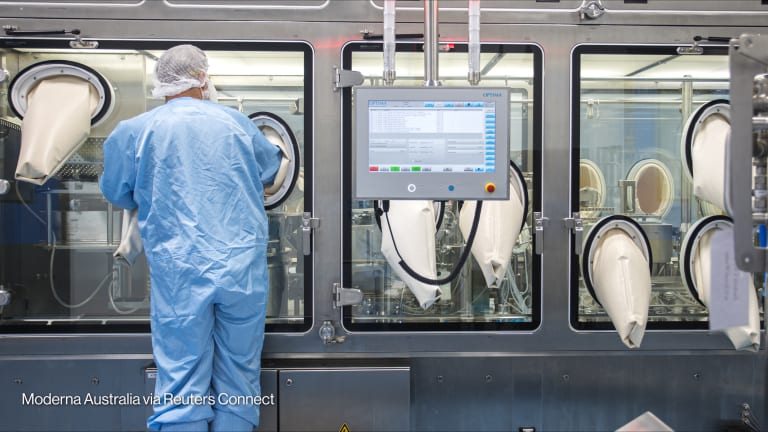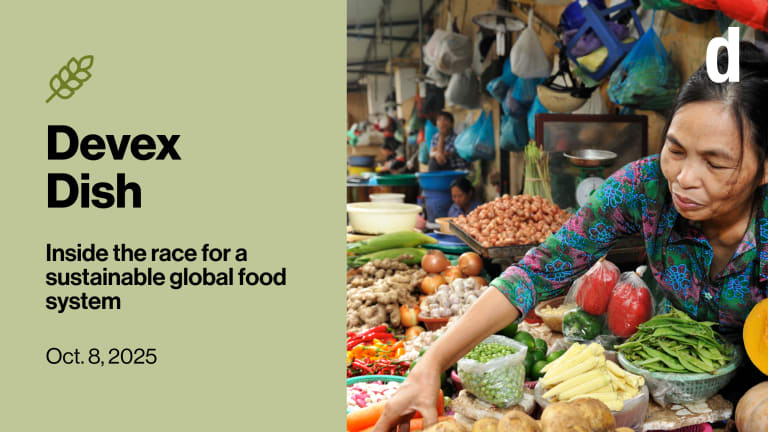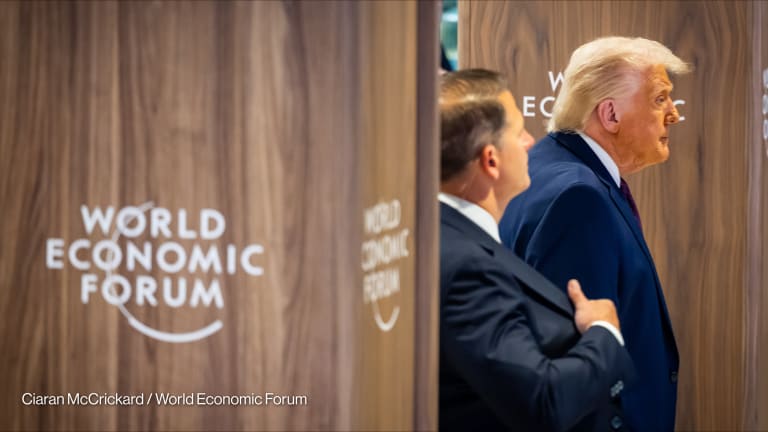Impossible Foods: On the menu in Davos, on a mission to scale globally

DAVOS, Switzerland — Traci Des Jardins, the San Francisco-based restaurateur, was the chef behind the menu at 10 different events at the World Economic Forum meetings in Davos last week. She and her team prepared meals as varied as Italian meatballs, French beef tartare, and Mexican tostadas. They were all made without meat, something that seemed to shock many first timers as they tried what was marketed as “a taste of tomorrow.”
Read Devex coverage of the World Economic Forum Annual Meeting in Davos:
▶ What does Davos mean for global development?
▶ Mark Green at Davos to 'tap into the creativity' of the private sector
► Opinion: Building a shared future in a fractured world starts with education and health
▶ Gates and IDB announce plan to eliminate malaria in Central America
▶ In Davos, the art of the development deal
▶ The Business and Sustainable Development Commission says goodbye as it highlights blended finance
Impossible Foods — who supplied the “meat” for the meals — is a Silicon Valley-based company known for the plant-based Impossible Burger. Its key ingredient is soy leghemoglobin, which releases a protein called heme when it breaks down, making the product taste and even bleed like real meat. Investors include Bill Gates and Vinod Khosla, just two examples of a growing number of billionaires who are putting their money behind so called “alt meat companies.”
Devex sat down with Pat Brown, the Stanford University biochemist and founder and CEO of the company, who talked about his mission to make the global food system more sustainable.
Eyes on Africa
“Apart from the mission of the company, I have zero interest in being in the business world at all, much less the food industry,” he said.
Brown — a vegan — is using his background in biochemistry to address what he calls the biggest environmental issue the world faces: Animal farming. Tied up with that mission is an interest in addressing global food security, he said. But before Brown can make his burgers accessible to everyone in the world, he has to build a sustainable business, which means overcoming regulatory barriers and making these products affordable far beyond the U.S. restaurants where they are currently served.
“We have every intention, probably within next two or three years, that our product will be cheaper than the cheapest animal-based products on the market,” he said.
Compared to burgers made from cows, the Impossible Burger uses a quarter of the water, produces an eighth of the greenhouse gas emissions, and takes up a twentieth of the land. These are fundamentally better economics, Brown said, and he hopes to bring these benefits to the developing world as soon as is feasible. Where there is rapid population growth, there is tremendous conflict over land and water, which are needed in massive amounts for animal agriculture, but people will not make the switch away from meat unless there is an affordable and desirable alternative.
“We’ve talked quite a bit to people in the food security world to find a business model for launching very early, particularly in Africa, because you have these two crises at the same time: People starving that have protein and iron deficiency, and irreplaceable ecosystems and natural habitats are being destroyed to expand animal agriculture,” he said. “So we want it to go get there as early as possible, even if it doesn’t make a tremendous amount of business sense.”
The future of meat
The demand for meat and protein is projected to double by 2050, when there will be 9 billion people on the planet, with 3 billion people in a growing middle class demanding red meat in particular. Livestock produces 15 percent of greenhouse gas emissions, meat production uses immense amounts of water and grain, and the whole system is a major driver of deforestation and habitat loss.
Last week, the World Economic Forum launched an initiative called Meat: The Future to promote public private cooperation around protein solutions to meet tomorrow’s demand in a sustainable way. It also published a white paper presenting options to make this transition before it is too late and aims to produce a final paper with recommendations at next year’s Davos summit.
“A portfolio of proteins will be needed, but this can only be delivered if the public and private sectors, food and tech experts, health experts, environment experts, and consumer representatives can accelerate the delivery of such 21st century proteins,” said Dominic Waughray, head of public-private partnership at the forum, in a press release.
“When it comes to the future of protein, taste, value, access, sustainability, and nutrition all matter — and there’s no one-size-fits-all solution to meeting all of those factors,” said Tom Hayes, president and CEO of Tyson Foods. “We can all agree that there are tremendous challenges in front of us and we all want to produce a better future. We must work together to evolve our current meat production, explore alternative proteins and encourage new consumer behaviours, especially on reducing food waste.”
Silicon Valley mojo
Impossible Foods is not the only company taking on this challenge, with Hampton Foods and Beyond Meat also working on making the future of food animal free.
“The thing I think is really part of the mojo of Silicon Valley is that it's considered not weird or arrogant to take on insanely ambitious projects and that’s a very empowering environment to be in if that’s what you want to do,” Brown said.
Brown said that he found sometimes the best way to solve a small problem is to solve a bigger problem, of which the smaller problem is a subset. In developing Impossible Foods, he avoided potentially quick shortcuts, like fake flavors. Since he wanted to eliminate meat as a category, he instead focused on what gives meat its magic, like the way it sears on the grill, which was a much harder problem to solve.
Brown said he appreciated the way the WEF’s emphasis on reducing the environmental impacts of the food system. He called this a contrast from COP 21 in Paris, France, when to his surprise none of the may environmentalists present was talking about animal farming as an environmental issue or climate change issue, he said.
“Virtually all of them are consumers of meat and fish and dairy foods, and so they are acutely aware of the fact that it is essentially impossible to get people to give up foods that are a major source of pleasure in their lives,” he said.
For billions of people, animal products are near the top of the list for their favorite foods, not to mention source of protein.
“Given that it seemed like this was an intractable problem. People felt like, ‘Why talk about it?’” Brown said.
But for Brown is a growing recognition that this is a solvable problem, and the solution lies in not asking people to give up anything they love, but rather producing alternatives they love just as much, that are better for them and also for the world.
Read Devex coverage of the World Economic Forum Annual Meeting in Davos.
Search for articles
Most Read
- 1
- 2
- 3
- 4
- 5








